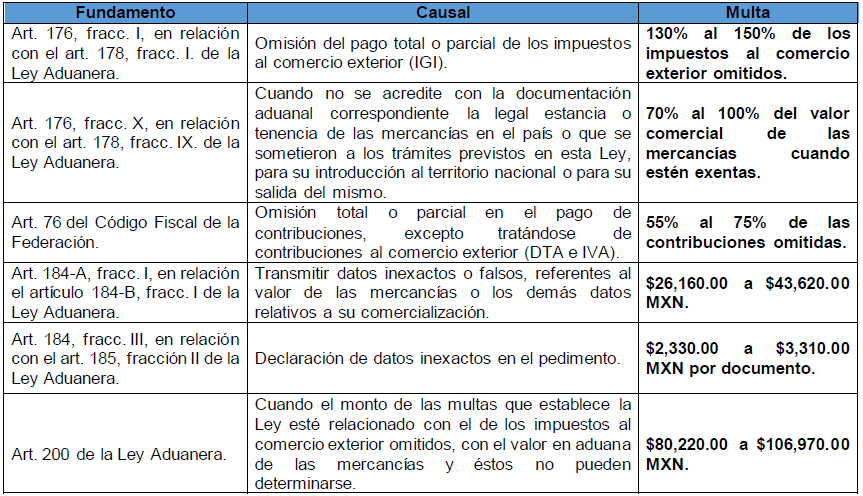

CIRCULAR 1/25 IAF® – Preventive Foreign Trade Audit
1/1/25, 5:00 PM
What is a Preventive Foreign Trade Audit?
A preventive foreign trade audit consists of reviewing records, systems, and any other tools containing information related to the company’s foreign trade operations. The purpose is to evaluate compliance with tax and customs obligations...
¿Qué es una auditoría preventiva de comercio exterior?
La auditoría preventiva de comercio exterior consiste en la revisión de los expedientes, sistemas y toda aquella herramienta que contenga información relacionada con las operaciones de comercio exterior realizadas por la empresa, con la finalidad de evaluar el cumplimiento de sus obligaciones fiscales y aduaneras. El objetivo per se de la auditoría preventiva es detectar cualquier irregularidad previo a que la autoridad ejerza sus facultades de comprobación, tales como visita domiciliaria, visita de verificación, revisión en origen, revisión de gabinete, revisión electrónica, etc. Una vez detectada la irregularidad, se puede efectuar la autocorrección espontanea de esta, sin ser sujetos a multas y/o en su caso el pago de accesorios.
Multas de comercio exterior.
Las multas más onerosas en el ámbito fiscal corresponden a las relacionadas con el comercio exterior, considerando que inclusive en diversos escenarios suele ser más elevada una multa de “forma” que de “fondo”, más allá del perjuicio al fisco que evidentemente represente una multa de “fondo”.
A continuación se ilustran las principales multas impuestas por la autoridad:

Medidas de apremio.
La consecuencia del incumplimiento a las disposiciones fiscales y aduaneras, no se limita sólo a la imposición de multas, sino que de manera paralela la autoridad tiene las facultades de aplicar otras medidas de apremio tipificadas en ley aduanera, así como en el código fiscal de la federación; las medidas de apremio son instrumentos coactivos que la autoridad utiliza para hacer cumplir sus actos y vencer la desobediencia o la contumacia de las partes, sin embargo, en muchas ocasiones estas medidas terminan por derrumbar el sustento de las compañías, como por ejemplo una empresa que subsiste de la importación de materia prima para su producción nacional, y que por incurrir en alguna conducta tipificada en la suspensión del padrón de importadores, la autoridad le aplica la referida medida apremio, y por consecuencia la empresa ya no podrá realizar la importación de materia prima, derrumbándose de tal modo la columna vertebral de su estructura comercial.
A continuación se enlistan las principales medidas de apremio aplicadas por la autoridad:
1.Imposición de multas.
2.Embargo de mercancías de procedencia extranjera.
3.Suspensión o cancelación de la certificación en materia de IVA/IEPS.
4.Solicitud de suspensión del programa IMMEX.
5.Suspensión en el padrón de importadores.
6.Solicitud de aseguramiento de cuentas bancarias.
7.Cancelación de sellos digitales.
8.Interposición de querella.
Modificaciones constantes en las disposiciones fiscales y aduaneras.
El comercio exterior es un área que continuamente está sufriendo diversas modificaciones en sus múltiples disposiciones fiscales y aduaneras, tales como la ley aduanera y su reglamento, reglas generales de comercio exterior, ley de impuestos generales de importación y exportación, ley de comercio exterior y su reglamento, tratados internacionales, reglas de Secretaría de Economía, decretos e inclusive el propio código fiscal de la federación. Es por ello que las empresas deben de realizar constantemente auditorías preventivas a fin de evitar incurrir en las irregularidades causadas por la volatilidad en las modificaciones de las referidas disposiciones, y en caso de incurrir en estas efectuar la autocorrección a la inmediatez, antes de que sea demasiado tarde y la autoridad haya ejercido sus facultades de comprobación.
Solución a tus problemas:
En razón de los múltiples acontecimientos suscitados a raíz de las constantes modificaciones de las disposiciones fiscales y aduaneras, y con la finalidad de prevenir y/o corregir las irregularidades fiscales y aduaneras, en IAF® nos hemos comprometido a evitar que las empresas incurran en las constantes y principales irregularidades detectadas por los órganos fiscalizadores, es por ello que hemos desarrollado un software denominado “SIAP” (Sistema Integral de Auditoría Preventiva), el cual consiste en el segregación de la glosa del “data stage”, cuyo objetivo es realizar análisis estratégicos con base a filtros selectivos, con el fin de detectar las principales irregularidades y/o áreas de oportunidad de las operaciones de comercio exterior realizadas por la empresa. Una vez detectadas las irregularidades y/o áreas de oportunidad, se emite un informe pormenorizado en el cual se consigna cada una las observaciones, la multa a la cual se haría acreedora la empresa en caso de no corregir su situación fiscal, así como la forma en que la empresa debe llevar a cabo su autocorrección fiscal antes de que la autoridad ejerza sus facultades de comprobación.
Conclusión:
Conforme a las cifras proyectadas por el gobierno federal respecto a la recaudación fiscal del ejercicio 2025 ($5,297,812.9 millones de pesos ), es evidente que los órganos fiscalizadores tienen instrucciones contundentes de aumentar los actos de fiscalización, siendo este uno de los métodos más fehacientes para la aceleración recaudatoria y/o en su caso para promover su presencia fiscal, y que por consecuencia los contribuyentes cumplan espontáneamente con sus obligaciones fiscales.
Por lo anterior, es indispensable prever y mitigar irregularidades en el cumplimiento fiscal y aduanero, por tal motivo la auditoría preventiva es una herramienta toral para tales propósitos, máxime aún que coadyuva para llevar a cabo un control interno de la compañía respecto al estatus actual que guarda (fiscalmente).
¡Cumplir con las leyes puede parecer costoso, pero incumplirlas resulta aún más!
© 2035 by Pastoral Acres. Made with Wix Studio

Torreón, Coahuila
Menu
